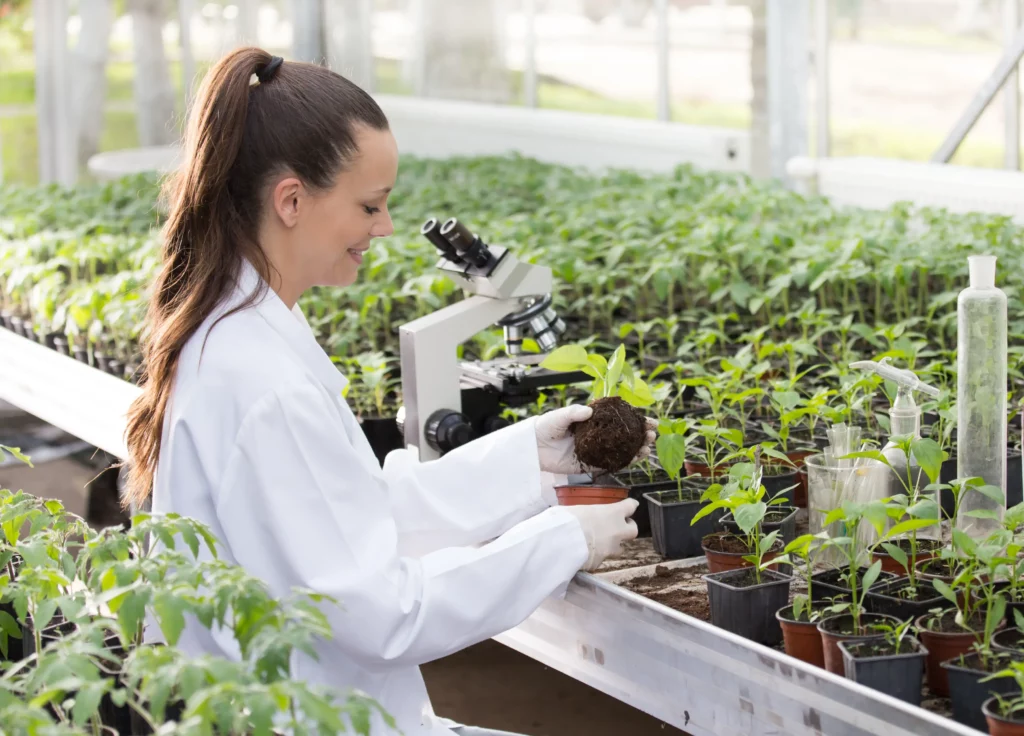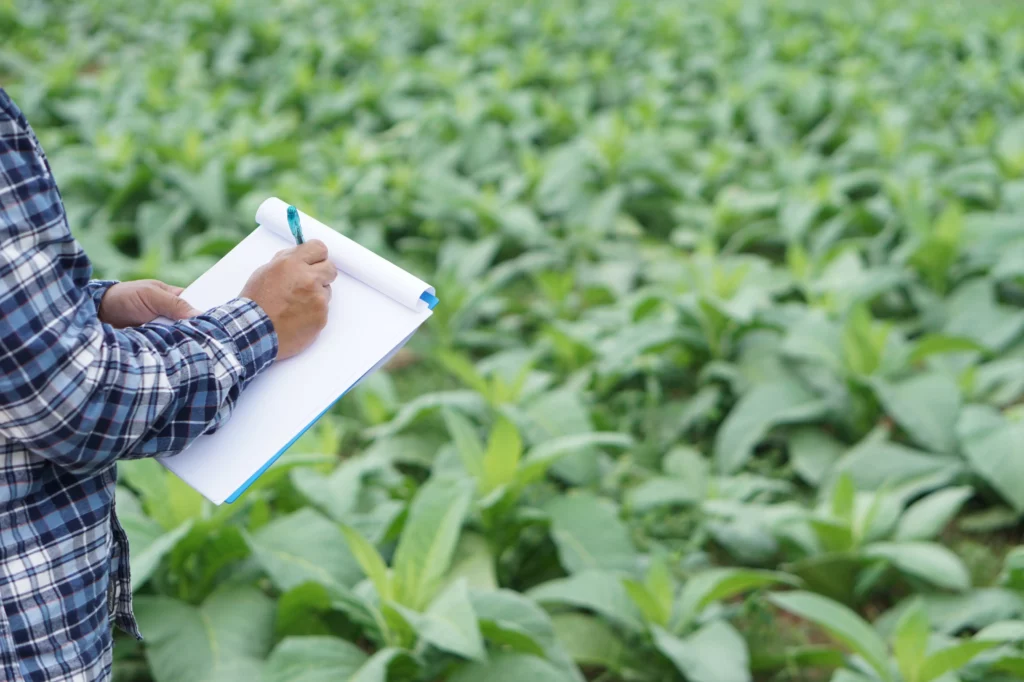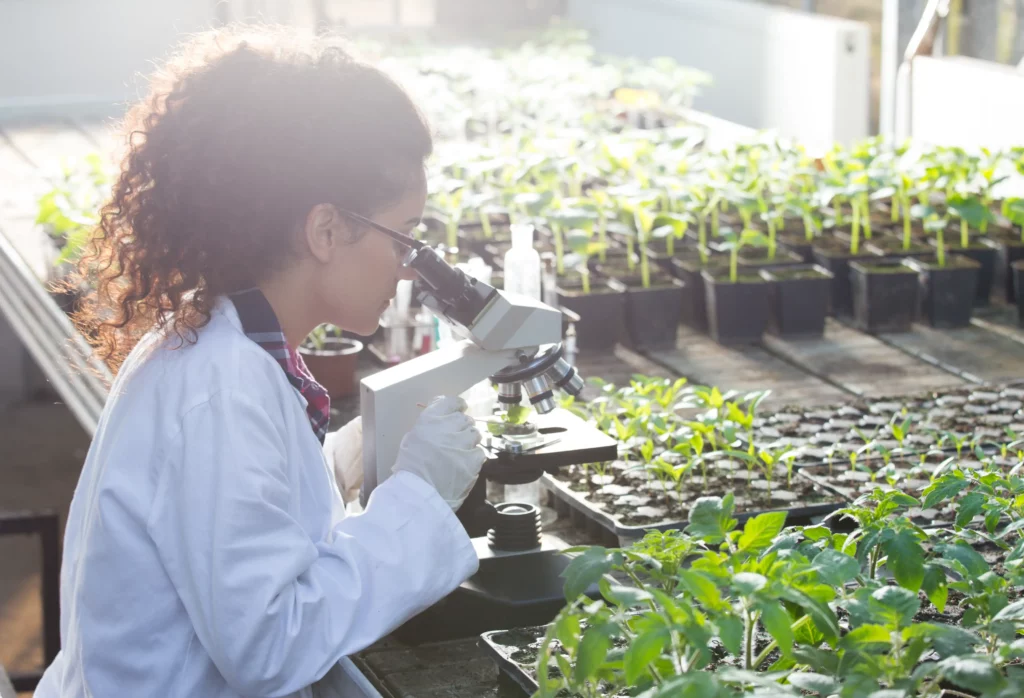
As the biostimulant market continues to grow, fuelled by increasing demand for sustainable agricultural solutions, the role of research in driving innovation and validating product claims becomes increasingly significant. The development of biostimulants—natural substances used in agriculture to enhance plant growth and resilience—relies heavily on meticulous research and extensive field trials. This article explores the importance of research and the pivotal role of field trials for the successful development, optimisation, and adoption of biostimulants in modern farming practices.
What Are Biostimulants?
Biostimulants are substances or microorganisms applied to plants or soils to improve crop vigour, yields, quality, and tolerance to abiotic stress. Unlike traditional fertilisers, biostimulants work by enhancing the plant’s natural processes. Biostimulants encompass a variety of products, including seaweed extracts, microbial inoculants, amino acids, and humic acids, each with unique functions. These substances do not serve as direct nutrient sources. Instead, they improve plant growth and resilience through different mechanisms.
The definition of biostimulants as outlined in the EU FPR 2019/1009 regulation:
“A plant biostimulant shall be an EU fertilizing product the function of which is to stimulate plant nutrition processes independently of the product’s nutrient content with the sole aim of improving one or more of the following characteristics of the plant or the plant rhizosphere:
- Nutrient use efficiency
- Tolerance to abiotic stress
- Quality traits
- Availability of confined nutrients in the soil or rhizosphere”.
This regulation identifies biostimulants by their claim. Research and field trial efficacy play a major role so that companies can carry the CE mark on the product label for access to a single market in Europe.
Why Research Is Crucial for Biostimulants Success

Outside of regulation, research is fundamental to the development and effectiveness of biostimulants, fulfilling several critical functions in a variety of crucial aspects. It ensures that we as a company can show growers around the world the proven proof of concept and application in the field with in-depth science across a number of different biological layers.
1. Biostimulant Research Helps Identify Active Components that Effectively Improve Plant Growth.
Research in biostimulant development starts with identifying which biostimulant components are active and elucidating their effects on plant physiology. This process often involves extensive laboratory testing and analysis to determine how these components interact with plant cells and influence growth patterns, stress responses, and overall health. The insights gained are crucial for identifying the bioactivity within the biostimulant.
For seaweed extract biostimulants, scientific research over the past 10 years has proven that the biostimulating action of commercial algae extracts (more efficient nutrition, abiotic stress protection or quality improvement) is completely independent of phytohormones, that of which may be in minute concentrations in these extracts (or not present in most commercial extracts). The carbohydrates present in these extracts are the most likely candidates that explain the bioactivity of commercial algae extracts in plants.
The European Biostimulant Industry Council (EBIC) has published a white paper on the bioactivity of commercial seaweed extracts. For a comprehensive overview, please access the full article through the following link: Recent Insights into the Mode of Action of Seaweed-Based Plant Biostimulants
2. Scientists Can Optimise Biostimulant Formulations Through Research.
Through rigorous experimentation, scientists can determine the most effective combinations and concentrations of ingredients in biostimulant research. This optimisation is important to ensure the highest efficacy of the product across different soil types, climatic conditions, and crop species. It also relates to scaling up from lab-scale experiments to pilot tests, ensuring that the agricultural biostimulants maintain their effectiveness when produced in larger quantities.
3. Researchers Gain a Deeper Understanding of the Modes of Action to Maximise Biostimulants Benefits.
Detailed biostimulant research allows scientists to uncover the precise modes of action through which biostimulants enrich plant performance. These mechanisms can vary widely, from improving the plant’s photosynthetic capacity and improving nutrient uptake and promoting growth and resilience. By understanding these mechanisms, researchers can tailor application strategies to maximise biostimulant benefits.
Additionally, understanding the mechanisms of action helps in communicating the benefits and proper use of biostimulants to agronomists and farmers, ensuring that these biostimulant products are used effectively to achieve their full potential. This knowledge also supports regulatory approval processes by providing clear evidence of how the product affects plants and ensuring it meets safety standards.
Through these biostimulant research avenues, the role of science is foundational in the development, refinement, and application of biostimulants in agriculture. Together, these activities highlight the research importance, driving innovations that are vital for optimising biostimulant formulations. This ensures their successful application in modern agriculture as well as more sustainable and productive farming practices.
Why Field Trials Are Significant for Biostimulants.

Field trials are vital for assessing the practical applicability of biostimulants in real-world agricultural settings. They provide crucial information that underscores the importance of field research, offering insights on various key aspects:
1. Biostimulant Research, Combined with Field Trials, Ensure Efficacy Verification.
Field trials help verify the effectiveness of biostimulants as observed in controlled environments. These field trials in research assess whether the benefits seen in the lab, such as increased growth rate or strengthened stress resistance, can translate to actual field conditions. This step is significant as it bridges the gap between controlled experimental results and real-world agricultural practices. It confirms that the theoretical advantages of biostimulants hold when exposed to the variables of outdoor environments, such as unpredictable weather and soil variability.
2. Field Trials Identify the Most Effective Application Methods for Various Crops and Conditions.
Field trials test different methods of application (e.g., foliar application, soil amendment) to find the most effective way to use biostimulants on specific crops. This exploration is vital because the mode of application can significantly influence the efficacy of biostimulants. For example, foliar applications may be more suitable for quick absorption for some crops, while soil applications might benefit root development more significantly. Testing these methods helps refine usage guidelines that maximise the benefits of biostimulants for various crops and conditions.
3. Field Trials in Research Demonstrate the Impact of Biostimulants on Crop Yield and Quality.
These field trials in research measure how biostimulants affect the yield and quality of produce, providing concrete data to farmers and agronomists. By quantifying the improvements in crop yield and quality, such as increased size, better colour, or enriched nutritional content, field trials provide empirical evidence that can convince stakeholders of the value of integrating biostimulants into their cultivation practices. This data is essential for making informed decisions about agricultural investments and practices.
4. Field Trials Assess Any Potential Environmental Impacts of Biostimulants to Enrich their Sustainability.
Biostimulant research with field trials in agriculture helps evaluate the performance of biostimulants across various environmental conditions and agricultural practices. This ensures the adaptability and robustness of the biostimulant products. This aspect of field trials is crucial because it tests the resilience of biostimulants against a range of abiotic stresses such as drought, heat, and salinity. The adaptability testing helps in fine-tuning the product to perform well under diverse conditions, thus supporting widespread adoption.
Through these comprehensive assessments, field trials demonstrate their indispensable role in confirming the suitability, effectiveness, and safety of biostimulants. They highlight the importance of field research, directly influencing the success and biostimulant market acceptance of these agricultural enhancements.
Research and Development by Brandon Bioscience

Brandon Bioscience dedicates a significant portion of its resources—15% of annual turnover—to research and development. This ensures Brandon Bioscience stays at the forefront of biostimulant production with our pioneering PSI® Technology platform. The role of R&D at Brandon Bioscience extends beyond product development to encompass a comprehensive exploration of marine biomolecules, our potential applications in agriculture, and the optimisation of these compounds for maximum efficacy and safety. The process involves a rigorous regimen of scientific validation at every step:
- Exploration of Novel Marine Bioactives: Leveraging in-depth knowledge of marine bioactives allows our company to explore untapped natural resources that could lead to breakthroughs in agricultural productivity.
- Precision in Biostimulation: Through Brandon Bioscience’s proprietary PSI® Precision Range, we can engineer plant signalling biomolecules that precisely target specific agricultural challenges, enriching crop resilience and productivity in targeted ways.
- Scalable and Sustainable Solutions: By collaborating extensively with industry peers, research institutions, and universities, Brandon Bioscience ensures that our innovations are also sustainable, offering solutions that contribute to the well-being of the ecosystem without compromising the needs of future generations.
This strategic investment in research and development allows Brandon Bioscience to develop highly specific, effective biostimulants that meet the complex demands of modern agriculture, driving significant returns on investment for growers through crop yields and sustainability.

The importance of research provides the scientific foundation for product development, enabling biostimulant manufacturers to understand and improve the physiological effects of biostimulants on plants. Meanwhile, field trials serve as critical real-world tests to validate the theoretical findings and refine the applications of these products. Together, research and field trials form the backbone of the biostimulant market, driving innovation, ensuring regulatory compliance, and ultimately fostering trust among consumers and producers alike.
Brandon Bioscience, an innovator in marine biotechnology, epitomises the integration of nature and science to foster advancements in the agricultural sector. Specialising in the production of precision biostimulant products, we are dedicated to rigorous research and development to deliver biostimulants that are both effective and environmentally sustainable. We need to ensure that our products meet the highest standards of efficacy and safety, contributing to a more sustainable agricultural future. For those interested in sustainable agricultural solutions, reach out to us to discover how our innovative biostimulant products can benefit your agricultural practices.




